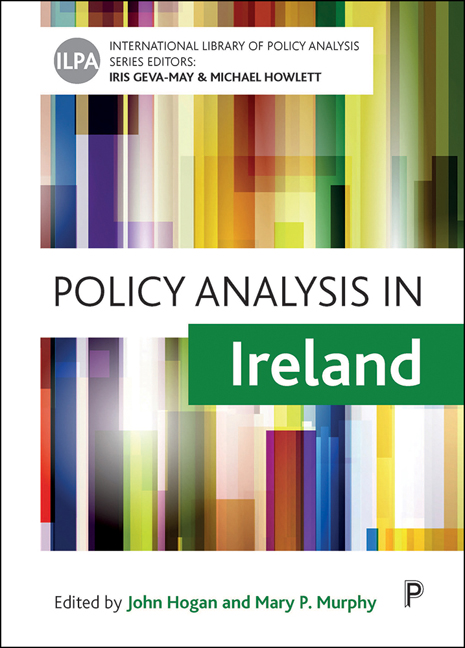Book contents
- Frontmatter
- Contents
- List of figures, tables and boxes
- List of abbreviations
- Notes on contributors
- Editors’ introduction to the series
- Acknowledgements
- Foreword
- Preface
- one Contextualising policy analysis in Ireland
- Part One: History, styles and methods of policy analysis in Ireland
- Part Two: Policy analysis at various levels of government: from local to the EU
- Part Three: Think tanks, interest groups, political parties and gender-based policy analysis
- Part Four: The public, science and the media: the wider policy analysis environment in Ireland
- Index
four - The changing policy analysis capacity of the Irish state
Published online by Cambridge University Press: 18 December 2021
- Frontmatter
- Contents
- List of figures, tables and boxes
- List of abbreviations
- Notes on contributors
- Editors’ introduction to the series
- Acknowledgements
- Foreword
- Preface
- one Contextualising policy analysis in Ireland
- Part One: History, styles and methods of policy analysis in Ireland
- Part Two: Policy analysis at various levels of government: from local to the EU
- Part Three: Think tanks, interest groups, political parties and gender-based policy analysis
- Part Four: The public, science and the media: the wider policy analysis environment in Ireland
- Index
Summary
Introduction
One of the paradoxes of modern government is that although there has never been as much data and evidence available to inform policy making as there is today, the solutions to the policy problems faced by governments appear more, rather than less, elusive. In part, this is a reflection of the changing nature of citizen expectation of the state, the growing number of ‘actors’ in all policy arenas, and greater recognition of the interdependence between complex policy problems and the mix of solutions required to address them. It remains the case, however, that the weight of responsibility for solving public policy problems rests with political executives, who in turn rely on the capacity of their administrations to present policy options to them. And so the quality of citizen's lives and experiences of government is heavily dependent on the ability of those administrative systems to recognise, understand and formulate policies that address the problems prioritised by their political masters.
The issue of policy analysis is the subject of much academic interest given that, as Lasswell (1970) identified, it is concerned with producing knowledge about policy as well as for policy. Beginning in the period after the Second World War with work by Lindblom (1959), Deutsch (1966), Heclo (1974) and others who sought to better understand the policy process within the public realm, today a variety of models abound to help us understand how and why those in positions of authority (politicians and top bureaucrats) choose to find and use evidence to make judgments on policy options and implement them (see Petridou, 2014 for an overview). For governments, policy analysis carries heavy normative and ideological significance as it involves judgments about what society and the economy should do and how citizens should live and experience public services.
Our understanding of how the role of policy analysis in government has developed mirrors the study of policy analysis more generally. For example, Van Nispen and Scholten (2016) propose that the performance of policy analysis has evolved through four stages, following a continuum that begins with a focus on a logic of consequence towards today's logic of appropriateness. The first stage was concerned with policy that could be implemented, and paid little heed to social research.
- Type
- Chapter
- Information
- Policy Analysis in Ireland , pp. 47 - 62Publisher: Bristol University PressPrint publication year: 2021

